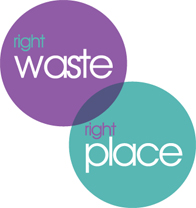



Simple Steps
Your Duty of Care starts from the moment you produce the waste
Simple Steps
Your Duty of Care starts from the moment you produce the waste
This page is a practical hub where you will find handy tips and tools to help you comply with waste regulations. There are some simple steps to take:
1. Identify the components of your waste and what to do with them
You can use the Need to Know Cards to help you identify some of the more common waste types and what to do with them. Some categories might all look the same, but they may require different approaches to dispose of them properly. Light bulbs are a good example of this as some types are defined as hazardous and others are not.
Your duty of care extends to knowing the difference!
2. Work out what waste can be recycled or reused
Ideally you should look to reuse or recycle as much of the waste you produce as possible. Our Guide to Using Skips poster can provide at a glance tips when using skips.
3. Separate your waste into recyclables, non-hazardous and hazardous categories and store accordingly
Duty of Care requires you to keep the waste you produce safely separated into categories. Separating into categories and labelling them will help your carrier be confident that they have the right waste.
4. Keep your waste secure
This will help keep your waste free of contamination and stop it escaping your control. If waste escapes your control you will be in breach of your Duty of Care and could be fined.
Search our site:
Useful links:
- England and Wales Duty of Care Code of Practice
- Scotland Duty of Care Code of Practice
- Northern Ireland Duty of Care Code of Practice
- Environment Agency Waste Guidance
- Scottish Environment Protection Agency Waste Guidance
- Natural Resources Wales Waste Guidance
- Northern Ireland Environment Agency Waste Guidance
- Latest waste news from Government
- Electronic Duty of Care

FAQs
Your Duty of Care starts from the moment you produce the waste
FAQs
Your Duty of Care starts from the moment you produce the waste
Frequently Asked Questions
What is Duty of Care?
By law, since 1990*, it has been a legal responsibility of ‘‘any commercial activity’’ - whether run from home or its own premises - to manage the waste it produces.
1997 in Northern Ireland
Why was Duty of Care introduced?
If it’s not managed properly, waste can pose a threat to the environment and human health. It is also a valuable resource which can often be reused or recycled. Duty of Care ensures that waste is handled in a responsible way.
What is waste?
Any material or item which you or your business have no further use for and wish to be removed. It might be capable of repair or re-use, but you are discarding it.
Materials might include the following:
Food/kitchen waste – such as cans, cartons and food
Computer waste – such as computer monitors and other electrical goods
Hazardous wastes – such as batteries and acid
Construction waste – such as wood and plasterboard
Office waste – such as paper and spent toner and printer cartridges
Production waste – off specification raw materials, scrap metals, packaging
Who does Duty of Care apply to?
It applies to anyone involved in the waste journey.
The waste producer – the person or company who has produced the waste
The waste carrier – the company collecting the waste
The waste manager – the company managing the waste
When does Duty of Care apply?
Your Duty of Care lasts from the moment you produce the waste until you give it to a licensed waste business to deal with. This may be a registered carrier or a waste site with a valid permit. You’re still responsible to check how that business deals with your waste and if you suspect it’s not following the Duty of Care you should report it by calling the environmental regulators hotline 0800 80 70 60 (24-hour service).*
*This number applies in England, Scotland and Wales. For Northern Ireland, call 028 9056 9453.
Does Duty of Care apply across the UK?
Yes, Duty of Care applies throughout the UK. It therefore applies throughout a waste’s journey across boundaries such as Wales to England or England to Scotland for example. Waste carrier ‘registration’ requirements apply across the UK so that a carrier registered in England is also registered to carry waste in Wales or Scotland for example. Permits however do differ, especially between England/Wales, Scotland and Northern Ireland.
What do I need to do if my waste might be hazardous ?
You should determine whether the waste is hazardous or not. There are a few ways you can check this:
Does it have a description or symbol on the goods?
Ask the supplier of the goods
Check the guidance here for England, for Wales, for Scotland and for Northern Ireland.
If your waste is hazardous then it needs to be dealt with by a specialist waste company.
You may also need to register your premises if you produce or store hazardous waste. If you produce or store hazardous waste in Wales then you will also need to register your premises with National Resources Wales.
If your waste is non-hazardous there are a number of options you must consider before you dispose of waste:
Can it be re-used or refurbished by someone else?
Can it be used for a similar purpose by someone else or somewhere else in your organisation or elsewhere? Could you sell/donate/swap unwanted items?
Can it be repaired?
Could you refurbish or repair some items instead of buying new ones? Search the internet for local repair services or contact your local council.
Can it be recycled?
You should wherever possible keep wastes separated, especially waste which can be recycled such as glass, paper, metals or plastics. Never mix hazardous waste with non-hazardous waste as this makes the whole load hazardous.
Is it part of your service provider’s normal recycling materials? If not, contact them and determine your options.
Useful links:
What if it can’t be re-used or recycled?
Contact a reputable waste management company to discuss treatment and disposal options.
How should I store my waste before it’s collected?
Make sure it’s stored properly so nothing can escape such as litter, liquids or odour
Prevent access to it by others, for example in a locked bin
Keep wastes separated where possible, especially recyclable wastes such as glass, paper, metals and plastics
Some waste, such as liquids or hazardous wastes, will need to be stored in specialised containers
What wastes need to be kept apart?
Healthcare/ hygiene wastes - like sanitary waste, nappies and first aid waste
Dry recyclables - like glass, paper, metals and plastic which should be collected in individual containers where possible
Confidential waste - keep in secure containers and dispose of in a security-appropriate way (shredding etc.)
Waste electronics (WEEE) - like phones computers, TVs, sound systems, electronic kids’ toys. Some of these could be hazardous waste.
Batteries - including portable and non-portable and by construction (Lithium etc.). Many of these are hazardous waste.
Where can I find a company to dispose of my waste?
Look for waste contractors in your area on the internet or telephone directories.
Check that any business you use to deal with your waste is licensed, and keep proof of this – e.g. take a copy of their licence.
What checks should I make on the company that collects my waste?
Check that they are registered as a ‘carrier of waste’ by visiting the following online registers: England, Scotland, Wales and Northern Ireland.
Ask to see a copy of their registration certificate and keep proof of this
Ask for a receipt
Ask where they are taking your waste
Keep a note of their name and vehicle registration
Be wary if the price seems to good to be true
Report suspicious operators to the environmental regulators or your local authority
What happens if I don’t comply?
If you don’t comply you are breaking the law and could face fines and prosecution. This could affect you if you want to bid for certain contracts and could damage your reputation.
What are the benefits of complying?
It is easy to comply with Duty of Care and could save you money. Following these simple steps will ensure that you comply and will help reduce illegal management of waste, which costs local authorities £50 million a year.
What should I do if I think a waste business has mishandled my waste?
If you suspect a waste businesses is not following the Duty of Care you should report it by calling the environmental regulators hotline 0800 80 70 60 (24-hour service).*
*This number applies in England, Scotland, Wales. For Northern Ireland contact: 028 9056 9453.
How can I find out more?
Find out more by visiting:
www.gov.uk/managing-your-waste-an-overview/duty-of-care
www.esauk.org
www.ciwm.co.uk
Search our site:
Useful links:

Need to know cards
Your Duty of Care starts from the moment you produce the waste
Need to know cards
Your Duty of Care starts from the moment you produce the waste
Need to know cards
These Need to Know cards are a handy guide to what you should do with different types of waste. Click the links below to find out more.










